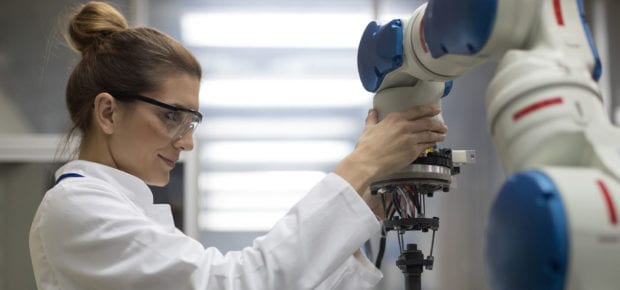September 26, 2017
Following the 2017 IEEE Sections Congress, IEEE Senior Member Tom Coughlin shared highlights from the keynote address of Dr. Alan Finkel, Chief Scientist for the Australian government, and an IEEE Fellow.
Finkel’s keynote addressed artificial intelligence, including a conversation about what humans can do to prepare for a world where artificial intelligence is par for the course. Finkel offered three key pieces of advice for the audience:
- Skill Up, Don’t Dumb Down: We should resist the temptation to let humans dumb down. “There is the argument that we don’t need advanced maths and science in schools. And there’s the suggestion that you don’t actually need to learn a discipline, or any hard content, because all the information you could ever need is available on line. And Siri or Alexa can find it on your behalf. I strongly disagree. The evidence suggests that workers will need to make their niche in a fluid and unpredictable environment. That suggests to me that we need to be more capable — not less. So we have to grab them young and keep them going. Then they can enter the artificial intelligence age with the capacity to hold their own. So skill up, don’t dumb down.”
- Improve Fluency in Human: “The essence of engineering is people: it is the capacity to design around our human limitations so that we, as a species, can transcend them. It takes a grasp of how humans behave — and an understanding of what humans want. We call that empathy. It’s the difference between the engineer who designs a product, and the engineer who delivers a solution. We don’t teach our students a formula for empathy. We haven’t got one. My alternative is to advise them with a single word: respect. Respect the intelligence of your audience. Respect their right to participate in the debate. And respect your rights and responsibilities as an expert — someone worthy of trust.”
- Embrace and Guide Thoughtful Regulation: “What we need is effective regulation to give our society the confidence to experiment. Effective regulation sets the rules that allow you to contribute to our human future. So, let’s be proactive in making the case. The IEEE gets it. It’s the essence of the IEEE Global Initiative launched last year for Ethically Aligned Design. How often do you come across a paper from the tech community that begins with a statement like this: human well-being is the highest virtue for a society, and human flourishing begins with conscious contemplation. It goes on: Our mission is to ensure every technologist is educated, trained, and empowered to prioritise ethical considerations in the design and development of autonomous and intelligent systems. That is the tech community I recognise: a community of intelligent and articulate people, with a genuine desire to make the world a better place.”
Written by: Tom Coughlin, IEEE Senior Member





 Meaningful Momentum or Running in Place?
Meaningful Momentum or Running in Place? AI Through Our Ages
AI Through Our Ages Liquid Infrastructure: Our Planet's Most Precious Resource
Liquid Infrastructure: Our Planet's Most Precious Resource The Impact of Technology in 2025
The Impact of Technology in 2025 Quantum and AI: Safeguards or Threats to Cybersecurity?
Quantum and AI: Safeguards or Threats to Cybersecurity? Why AI Can't Live Without Us
Why AI Can't Live Without Us Bits, Bytes, Buildings and Bridges: Digital-Driven Infrastructure
Bits, Bytes, Buildings and Bridges: Digital-Driven Infrastructure Impact of Technology in 2024
Impact of Technology in 2024 Emerging AI Cybersecurity Challenges and Solutions
Emerging AI Cybersecurity Challenges and Solutions The Skies are Unlimited
The Skies are Unlimited Smart Cities 2030: How Tech is Reshaping Urbanscapes
Smart Cities 2030: How Tech is Reshaping Urbanscapes Impact of Technology 2023
Impact of Technology 2023 Cybersecurity for Life-Changing Innovations
Cybersecurity for Life-Changing Innovations Smarter Wearables Healthier Life
Smarter Wearables Healthier Life Infrastructure In Motion
Infrastructure In Motion The Impact of Tech in 2022 and Beyond
The Impact of Tech in 2022 and Beyond Cybersecurity, Technology and Protecting Our World
Cybersecurity, Technology and Protecting Our World How Technology Helps us Understand Our Health and Wellness
How Technology Helps us Understand Our Health and Wellness The Resilience of Humanity
The Resilience of Humanity Harnessing and Sustaining our Natural Resources
Harnessing and Sustaining our Natural Resources Creating Healthy Spaces Through Technology
Creating Healthy Spaces Through Technology Exceptional Infrastructure Challenges, Technology and Humanity
Exceptional Infrastructure Challenges, Technology and Humanity The Global Impact of IEEE's 802 Standards
The Global Impact of IEEE's 802 Standards Scenes of our Cyber Lives: The Security Threats and Technology Solutions Protecting Us
Scenes of our Cyber Lives: The Security Threats and Technology Solutions Protecting Us How Millennial Parents are Embracing Health and Wellness Technologies for Their Generation Alpha Kids
How Millennial Parents are Embracing Health and Wellness Technologies for Their Generation Alpha Kids Space Exploration, Technology and Our Lives
Space Exploration, Technology and Our Lives Global Innovation and the Environment
Global Innovation and the Environment How Technology, Privacy and Security are Changing Each Other (And Us)
How Technology, Privacy and Security are Changing Each Other (And Us) Find us in booth 31506, LVCC South Hall 3 and experience the Technology Moon Walk
Find us in booth 31506, LVCC South Hall 3 and experience the Technology Moon Walk Virtual and Mixed Reality
Virtual and Mixed Reality How Robots are Improving our Health
How Robots are Improving our Health IEEE Experts and the Robots They are Teaching
IEEE Experts and the Robots They are Teaching See how millennial parents around the world see AI impacting the lives of their tech-infused offspring
See how millennial parents around the world see AI impacting the lives of their tech-infused offspring Take the journey from farm to table and learn how IoT will help us reach the rising demand for food production
Take the journey from farm to table and learn how IoT will help us reach the rising demand for food production Watch technical experts discuss the latest cyber threats
Watch technical experts discuss the latest cyber threats Explore how researchers, teachers, explorers, healthcare and medical professionals use immersive technologies
Explore how researchers, teachers, explorers, healthcare and medical professionals use immersive technologies Follow the timeline to see how Generation AI will be impacted by technology
Follow the timeline to see how Generation AI will be impacted by technology Learn how your IoT data can be used by experiencing a day in a connected life
Learn how your IoT data can be used by experiencing a day in a connected life Listen to technical experts discuss the biggest security threats today
Listen to technical experts discuss the biggest security threats today See how tech has influenced and evolved with the Games
See how tech has influenced and evolved with the Games Enter our virtual home to explore the IoT (Internet of Things) technologies
Enter our virtual home to explore the IoT (Internet of Things) technologies Explore an interactive map showcasing exciting innovations in robotics
Explore an interactive map showcasing exciting innovations in robotics Interactively explore A.I. in recent Hollywood movies
Interactively explore A.I. in recent Hollywood movies Get immersed in technologies that will improve patients' lives
Get immersed in technologies that will improve patients' lives